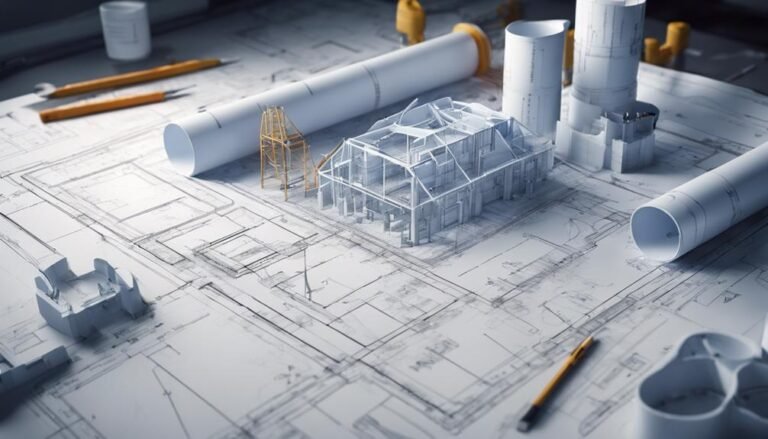Building and Maintaining Client Relationships in Construction
Mastering the art of client relationships in construction is key to success. Build trust by establishing credibility and showing genuine interest. Use clear communication strategies, provide feedback, and practice active listening. Manage client expectations by defining project scope and setting boundaries upfront. Resolve conflicts with open communication and transparency. Cultivate positive relationships through professionalism and timely communication. Aim for long-term partnerships by focusing on relationship longevity, mutual benefit, and trust-building. Establish professionalism with transparent processes and consistent work. Prioritize client trust and effective communication for lasting success in the construction industry. Further insights await to enhance your client relationships.
Key Takeaways
- Establish trust through open and honest communication.
- Manage expectations by setting boundaries and clear timelines.
- Resolve conflicts with open communication and active listening.
- Cultivate positive relationships with personalized approaches.
- Focus on long-term partnerships through mutual benefit and adaptability.
Importance of Client Trust
Building strong relationships in construction begins with establishing and nurturing client trust from the initial project stages. Building rapport and establishing credibility are vital components in fostering this trust.
To build rapport, show genuine interest in your clients’ needs and concerns. Listen actively to their ideas and feedback, demonstrating that their opinions are valued. By engaging in open and honest communication, you can create a foundation of trust that will strengthen your relationship over time.
Establishing credibility is equally significant. Clients need to see that you’re knowledgeable, reliable, and capable of delivering the results they expect. Showcase your expertise by providing solutions to their problems and demonstrating a track record of successful projects. Transparency is key in building credibility, so be upfront about timelines, costs, and potential challenges.
Clear Communication Strategies
Establishing clear communication strategies is essential for fostering trust and collaboration in construction projects. In the domain of construction, effective feedback plays a crucial role in ensuring that all project stakeholders are on the same page. Providing constructive feedback in a timely manner can help address issues promptly, leading to smoother project progression.
Active listening is another key aspect of clear communication strategies. By actively listening to the concerns and ideas of clients and team members, you demonstrate respect and build stronger relationships. It’s important to pay attention not only to the words being said but also to the underlying emotions and intentions.
Moreover, setting up regular communication channels, such as weekly progress meetings or daily check-ins, can enhance project transparency and accountability. Encouraging an open-door policy where all parties feel comfortable voicing their opinions can further improve communication flow. By incorporating effective feedback mechanisms and practicing active listening, you lay the foundation for successful client relationships in construction projects.
Managing Client Expectations
To effectively manage client expectations in construction projects, it is essential to establish clear parameters and timelines from the outset. Setting boundaries and defining realistic timelines help create a shared understanding between you and the client, ensuring that both parties are on the same page throughout the project. By clearly outlining what can and cannot be achieved within a given timeframe, you can avoid potential misunderstandings and disappointments down the line.
| Setting Boundaries | Realistic Timelines |
|---|---|
| Clearly define project scope and deliverables | Establish achievable milestones and deadlines |
| Communicate any limitations or restrictions upfront | Provide regular updates on progress and any deviations from the original timeline |
| Manage client expectations by being transparent | Adjust timelines as needed based on project complexities and unforeseen challenges |
| Encourage open dialogue to address any concerns or changes | Collaborate with the client to find solutions and maintain project momentum |
Maintaining a proactive approach to managing client expectations through setting boundaries and realistic timelines is key to fostering a positive and trusting relationship throughout the construction project.
Conflict Resolution Techniques
When conflicts arise in construction projects, utilizing open communication practices is essential for resolving issues efficiently.
By implementing mediation strategies for disputes, you can facilitate constructive dialogue and find mutually beneficial solutions.
Collaborative problem-solving approaches further enhance client relationships by demonstrating a commitment to working together towards successful project outcomes.
Open Communication Practices
Maintaining a constant flow of open communication channels is essential in effectively resolving conflicts within construction client relationships. When dealing with conflicts, consider the following strategies:
- Provide Effective Feedback: Clearly communicate concerns and provide constructive feedback to address issues promptly.
- Offer Timely Updates: Keep clients informed about project progress and any potential delays to manage expectations effectively.
- Active Listening: Actively listen to client concerns and make sure their perspectives are understood and acknowledged.
- Transparency: Be transparent about project developments, budget changes, and any challenges that may arise.
- Seek Resolution Together: Collaborate with clients to find mutually beneficial solutions and uphold a positive working relationship throughout the construction process.
Mediation Strategies for Disputes
Implementing effective mediation strategies is essential for resolving disputes and maintaining positive client relationships in the construction industry. When conflicts arise, using effective negotiation tactics and conflict prevention strategies can help in reaching mutually beneficial agreements. Client relationship mediation involves actively listening to both parties, understanding their perspectives, and guiding them towards a resolution. Utilizing dispute resolution techniques like mediation sessions, where a neutral third party facilitates communication, can lead to successful outcomes. By fostering open dialogue and encouraging cooperation, conflicts can be addressed promptly, preventing escalation and preserving the client-contractor relationship.
| Effective Negotiation Tactics | Conflict Prevention Strategies |
|---|---|
| Active Listening | Clear Communication |
| Finding Common Ground | Establishing Clear Expectations |
Collaborative Problem-Solving Approaches
To effectively navigate collaborative problem-solving approaches in conflict resolution techniques within the construction industry, prioritize clear communication and proactive engagement with all involved parties. When resolving conflicts, consider the following:
- Active Listening: Engage in attentive listening to understand all perspectives.
- Brainstorming Sessions: Encourage collaborative innovation through group idea generation.
- Conflict Mapping: Identify the root causes and effects of the conflict to address them effectively.
- Work Towards Win-Win Negotiation: Aim for solutions where all parties benefit for sustainable outcomes.
- Agree on Action Steps: Establish clear steps and responsibilities to implement solutions effectively.
Cultivating Positive Relationships
Strategically fostering strong connections with clients is essential in the construction industry to guarantee successful project outcomes. Building rapport while maintaining professional boundaries is a delicate balance that can be achieved through effective communication and a client-centered approach. By understanding your clients’ needs and preferences, you can tailor your interactions to cultivate positive relationships that are built on trust and respect.
| Building Rapport | Professional Boundaries |
|---|---|
| Active Listening | Clear Scope of Work |
| Timely Communication | Transparent Processes |
| Personalized Approach | Respectful Feedback |
Active listening allows you to comprehend your clients’ goals and concerns, while timely communication ensures that any issues are addressed promptly. A personalized approach demonstrates your commitment to meeting the client’s specific requirements. On the other hand, maintaining clear boundaries through a well-defined scope of work and transparent processes helps establish professionalism and ensures that expectations are managed effectively. By incorporating these strategies into your client relationships, you can lay a solid foundation for successful collaborations in the construction industry.
Long-Term Partnership Building
Developing enduring partnerships with clients in the construction industry requires consistent communication and a proactive approach to anticipate future needs and challenges. To build long-term relationships that are mutually beneficial, trust-building and maintaining open lines of communication are essential.
Here’s a strategic approach to foster long-term partnerships:
- Relationship Longevity: Focus on establishing relationships that go beyond a single project, aiming for partnerships that last for years to come.
- Mutual Benefit: Make sure that both parties benefit from the partnership, creating value for the client while also achieving your business goals.
- Trust Building: Prioritize transparency, honesty, and reliability to build a foundation of trust with your clients.
- Consistent Communication: Regularly update clients on project progress, challenges, and successes to keep them engaged and informed.
- Adaptability: Be flexible and adaptive to meet changing client needs and industry trends, ensuring your partnership evolves over time.
Conclusion
In summary, building and maintaining client relationships in construction is essential for the success of any project. By establishing trust, communicating effectively, managing expectations, resolving conflicts, and cultivating positive relationships, you can create long-term partnerships that benefit both parties.
Remember, the key to success lies in balancing attention to detail with strategic communication strategies. It’s through this careful balance that you can truly excel in the construction industry.







